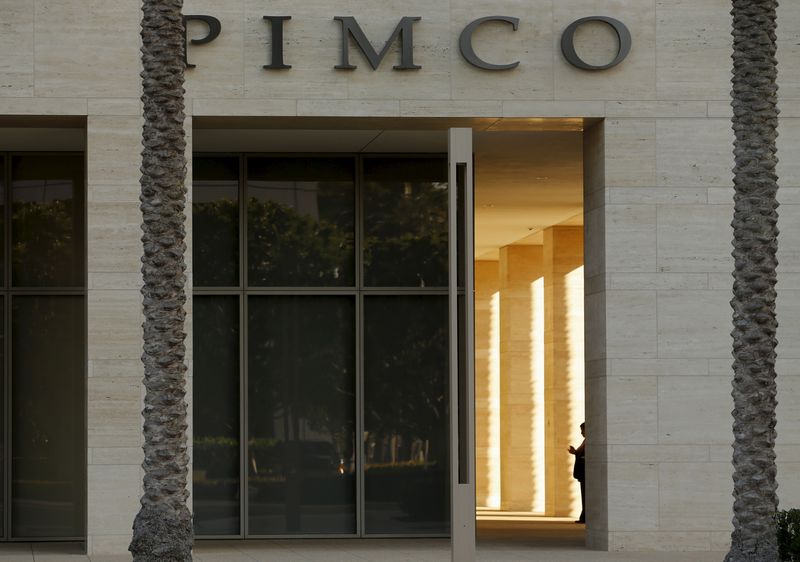By Jonathan Spicer and Marc Jones
ISTANBUL/LONDON (Reuters) - U.S. investment giants Pimco and Vanguard have bought local Turkish assets in recent months, betting that the country will maintain high interest rates after years of erratic policymaking under President Tayyip Erdogan.
Interviews with top money managers at the companies show that two of the world's biggest investors, which together oversee nearly $10 trillion in assets, have grown constructive on Turkey since its newfound economic orthodoxy following Erdogan's re-election in May.
Pimco and Vanguard did not elaborate on the specific size of their purchases but the investments are a sign of confidence after a years-long exodus of foreigners that left Turkey on the sidelines of global emerging markets.
"We are constructive on Turkish assets, in particular local currency assets, due to the tightening in financial conditions to rein in spending and control inflation and the gradual easing of regulations that distort the asset prices," said Pramol Dhawan, managing director and head of emerging markets at Pimco, which oversees nearly $2 trillion in assets.
Vanguard, the world's second-largest money manager with nearly $7.5 trillion, bought Turkish local bonds without hedging late last year after Nick Eisinger, co-head of Emerging Markets Active Fixed Income, and a few other investors visited the country for meetings.
"It was a bit of a watershed moment," Eisinger said in a separate interview, noting that benchmark yields later dropped by 500-600 basis points from November to mid-December, before partially rebounding this week.
Buying interest from abroad hit a six-year high last month while credit default swaps (CDS), a key risk measure, have plunged to less than half of levels in May.
That marks a dizzying departure from the days in which foreign investors largely abandoned Turkey as Erdogan oversaw a policy of slashing interest rates in the face of soaring inflation, and tightened authorities' grip on foreign exchange, debt and credit markets, leaving them largely state managed.
In June, Erdogan named a new cabinet and central bank chief, Hafize Gaye Erkan, who has since hiked rates by 3,400 basis points to 42.5% to rein in inflation that neared 65% last month.
The bank says it will halt the aggressive rate hikes as soon as possible but maintain tight monetary policy as long as needed. Authorities have also begun untangling dozens of regulations in order to free up banks and financial markets.
Pimco's Dhawan said "a period of real FX appreciation coupled with tight fiscal policy is needed to bring down inflation towards target levels", given the high domestic demand and dollarisation levels, as well as extended lira depreciation.
"We are already starting to see some benefits materialize from this coordinated policy framework," he said, adding the rising forex reserves have relieved a key investor concern.
ERDOGAN RISK
Though some investors are cautious, the foreign interest is primed to grow, drawn by potentially outsized bond returns. Amundi, Europe's largest asset manager, has also taken a more bullish position on Turkish assets, Reuters reported.
The risk, investors say, is that Erdogan loses patience with the long and painful return to orthodoxy - including an economic slowdown - as his ruling AK Party seeks to wrest back control of big cities in nationwide local elections on March 31.
Opposition victories five years ago in Erdogan's native Istanbul and Ankara were his biggest electoral defeats in more than two decades in power.
To boost his campaign ahead of last year's election, Erdogan - a self-described "enemy" of interest rates in the past - leveraged the budget and central bank to deliver record social spending and used foreign reserves to steady the lira.
He has also fired four central bank chiefs in the last five years, eroding its independence. In response, foreign holdings of government bonds crashed below 1% from 20% in 2018, before rebounding back above 1% late last year.
"The real litmus test is what happens in the next few months" with the elections and the central bank's focus on tackling inflation, Vanguard's Eisinger said.
Vanguard invested when Turkish bond yields were up near 35% and it could expand the position, he said. "Potentially we would look to do more of that trade if yields back up."
Wall Street bank JPMorgan said Turkey's lira was a key emerging market bet for 2024 while UBS recommended clients take a "tactical long" position on the currency in November.
Erkan, the new central bank chief and former Goldman banker, and Finance Minister Mehmet Simsek will present Turkey's policy vision to foreign investors in New York on Thursday next week.
